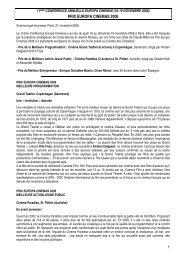Supplément du Film français - Europa Cinemas
Supplément du Film français - Europa Cinemas
Supplément du Film français - Europa Cinemas
Create successful ePaper yourself
Turn your PDF publications into a flip-book with our unique Google optimized e-Paper software.
14 enquête / investigation15L’europe prendLEVIRAGE<strong>du</strong> numeriqueEn 2011, l’exploitation cinématographique de filmseuropéens était toujours le secteur le plus stable et leplus rentable d’Europe, selon une étude de l’organisationprofessionnelle Unic, l’Union internationale des cinémas,qui offre un aperçu de l’état de santé de l’exploitationcinématographique en Europe. ■ Liza ForemanAlors que le redoutable passage au numériquedoit s’effectuer en pleine crise financière, lesexploitants européens tentent de mainteniren vie les cinémas d’art et essai <strong>du</strong> continentet de préserver une place pour la pro<strong>du</strong>ctioneuropéenne sur grand écran, en cherchantdes alternatives au modèle VPF. “Pour l’instant, nous sommesen mesure d’annoncer qu’aucun des plus petits cinémas n’afermé à cause de la transition numérique, déclare Jan Runge,Pdg de l’Unic. En fait, le numérique a considérablement renforcénombre de petites salles sur plusieurs territoires. Nous assistonségalement à la construction de nouveaux multiplexes enEurope centrale et de l’Est, ainsi qu’en Russie, et de nombreusessociétés sont très actives sur des marchés émergents commel’Europe de l’Est, à l’instar de Cinema City International, pourne citer qu’eux.”En plus de la transition numérique, un autre sujet est sourcede préoccupation, celui des fenêtres de diffusion pour lasalle. Runge parle d’une “lutte constante.” L’an dernier, à titred’exemple, l’association des cinémas danois avait entamé desnégociations avec celle des distributeurs à propos de la périodede délai entre la sortie d’un film en salle et sa sortie en DVDou VOD. Les distributeurs ont souhaité que ce délai soit ré<strong>du</strong>ità quatre mois pour les “petites” sorties, qui ont <strong>du</strong> mal à fairebeaucoup d’entrées et bloquent les salles pour des films plus importants.En septembre, les organisations principales des exploitantseuropéens, dont l’Unic, la Cicae et <strong>Europa</strong> <strong>Cinemas</strong>, ontallié leurs forces dans une lettre ouverte aux décideurs de la politiqueaudiovisuelle – en d’autres termes, Bruxelles – pour les encouragerà placer les salles au cœur d’un “nouveau programmepour le cinéma” dans le dessein de protéger les films européenset leurs salles suite à un projet lancé par la Commission euro-péenne sur les sorties simultanées. “Il est important de montreraux décideurs de Bruxelles que tous les cinémas – petitset grands – profitent de cette fenêtre de diffusion en exclusivité.Cela concerne toute l’in<strong>du</strong>strie européenne”, explique Runge.La lettre a été envoyée à quatre commissaires européens et auxresponsables politiques des 27 pays membres de l’Union européenne.Les signataires s’inquiètent que les opérateurs de petiteet moyenne tailles qui ont peine à financer le passage au numériquesoient contraints de fermer leurs portes si aucune solutionfinancière n’est apportée. “Il s’agit <strong>du</strong> problème le plus urgentauquel est confrontée l’in<strong>du</strong>strie <strong>du</strong> cinéma à ce jour et, s’il n’estpas résolu, de nombreux cinémas de quartier seraient contraintsà la fermeture dans plusieurs régions importantes de l’Europe”,préviennent les organisations dans cette lettre.pas de déresponsabilisationau profit de bruxellesCes organisations cherchent à collaborer avec les in<strong>du</strong>stries etles gouvernements des États membres de l’Union afin d’éviterque les institutions européennes ne prennent peu à peu lecontrôle sur le sujet des sorties, c’est-à-dire sur les dates et lesmodalités. Les stratégies de sorties de films sont différentesd’un pays à l’autre, <strong>du</strong> fait des divers aspects culturels, linguistiqueset structurels. “Par conséquent, les responsables de l’UEdevraient faire davantage confiance au secteur ainsi qu’à leurscollègues au niveau national pour décider de la meilleure approcheen ce qui concerne la distribution des films sur chaqueterritoire”, explique la lettre. Ces organisations souhaitent que lesexploitants restent au cœur <strong>du</strong> processus quand il s’agit d’assurerla promotion croisée de films européens entre les différentsÉtats membres. “Nous approuvons pleinement la volonté desinstitutions européennes de révéler le potentiel d’un marchépaneuropéen pour les films et nous croyons que les salles decinémas sont les mieux placées pour susciter un engouementet de la demande pour des titres étrangers”, ajoute la lettre. Lesexploitants européens assurent qu’ils jouent un rôle vital dansle domaine de la présentation des films. “Il est communémentadmis que la salle de cinéma est le lieu idéal pour profiter d’uneœuvre cinématographique. Il n’est absolument pas possible decomparer la projection d’un film en salle avec une diffusion surun appareil mobile”, argumentent-ils.Après une année aux résultats mitigés en 2010, les chiffres<strong>du</strong> box-office et la fréquentation des salles étaient largementSuite page 16Europe Goes DigitalEuropean cinema exhibition remained the moststable and profitable sector of the film in<strong>du</strong>stryin Europe in 2011, according to a recent study bythe exhibition trade organization, the InternationalUnion of <strong>Cinemas</strong> (UNIC), giving some insight intothe state of the exhibition business in Europe.■ Liza ForemanAmidst the daunting task of transitioning to digital, right in themiddle of the financial crisis, exhibitors in Europe are attemptingto keep the continent’s art house cinemas and make roomfor European content on the big screen by finding alternativesto VPF model. “As far as we can tell, the digital transition hasnot impacted smaller cinemas negatively ,” Jan Runge, CEOof UNIC, said. “In fact, digital has considerably strengthenedmany smaller cinemas in several territories. We are also seeingnew multiplexes being built in Eastern and Central Europe, aswell as in Russia, and some very active companies in emergingmarkets such as Eastern Europe, including Cinema CityInternational.”Another concern is the governance of theatrical windows,which Runge describes as “an ongoing struggle.” For example,last year, the association of Danish <strong>Cinemas</strong> began negotiatingwith the Danish Distributors Association over the holdbackperiod between theatrical and DVD-VOD windows, i.e.the time that must pass before a film can be released on anothermedia after it has been shown in the theatre. Distributorswanted it re<strong>du</strong>ced from four months for “small” local releases,which can be difficult to sell at the box office and prevent biggerfilms from getting to the screen. In September, the leadingorganizations for European exhibitors, including UNIC, CICAEand <strong>Europa</strong> <strong>Cinemas</strong>, joined forces to issue an open letterencouraging audiovisual policy-makers – think Brussels – toplace cinemas at the centre of a so-called “new agenda forfilm” and protect European films and theatres, following anew support scheme for day-and-date releases launched bythe European Commission. “It is important to show to policymakers in Brussels that all cinemas – large and small – benefitfrom an exclusive and sustainable theatrical window. Thesame goes for the entire European in<strong>du</strong>stry,” Runge added.The letter was sent to four European Commissioners, andthe heads of the 27 EU member states. The signatories wereprimarily concerned by the fact that small and medium-sizedoperators that are struggling to finance the transition to digitalare in danger of closure if no financing solutions are found.“This is the most pressing issue for Europe’s film in<strong>du</strong>stry todate and, if not solved, could devastate access to local cinemasacross some important regions of Europe,” they warnedin the letter.These organizations are seeking to collaborate with the in<strong>du</strong>stryand governments in EU member states to ensure that theEuropean institutions won’t slowly take over their remit whenit comes to deciding how and when films should be released.Release strategies for films are different from country tocountry, because of various cultural, linguistic and structuralcircumstances. “Therefore, EU officials should have more trustin the sector, as well as in their colleagues at national level, todecide on the best approach to release films in each territory,”© drthe letter said. These organizations want to keep exhibitorsfront and centre when it comes to cross-promoting Europeanfilms between the member states. “We fully embrace the continent’sinstitutions’ desire to unleash the potential of a pan-European market for films and believe that cinema theatresare best suited to create excitement and demand for foreigntitles,” it said. Exhibitors in Europe maintain that they are vitalto the business of showing films as they were designed to beseen.“<strong>Cinemas</strong> are considered the gold standard for enjoying acinematographic work. It is simply not possible to compare thecinema experience with watching a film on a mobile device,”they argued.box office earnings and attendancewas mostly positive in 2011After a year of mixed results in 2010, box office earnings andcinema attendance in European Union territories was mostlypositive in 2011, boding well for the exhibition business.Exhibitors are also benefiting from the strong performance oflocal films in many territories. The Russian box office continuedto grow in 2011, as did the Turkish market, and Franceperformed especially well, thanks to local films, as per UNIC’sannual report on cinema. Norway – the first European territoryto become 100% digital in 2011 – put in a strong performance,while the Netherlands had an extraordinary year and shouldbe fully digital by 2012.Gross box office increased in nine European Union territoriesoverall, a slightly higher number than in 2010. Russianbox office grew by a strong 18%, with the second strongestgrowth recorded in Norway (9%). Germany, the Netherlandsand Luxembourg registered significant admissions, closelyfollowed by France, Norway and Sweden. French admissionsreached their highest level since 1966 and Dutch admissions,since 1978. But Italy, Finland and Spain saw them drop.Le Kino <strong>Europa</strong>de Zagreb.Zagreb’s Kino<strong>Europa</strong>.Ctd on page 17<strong>Europa</strong> <strong>Cinemas</strong> 20 e anniversaire<strong>Europa</strong> <strong>Cinemas</strong> 20 th anniversary
















